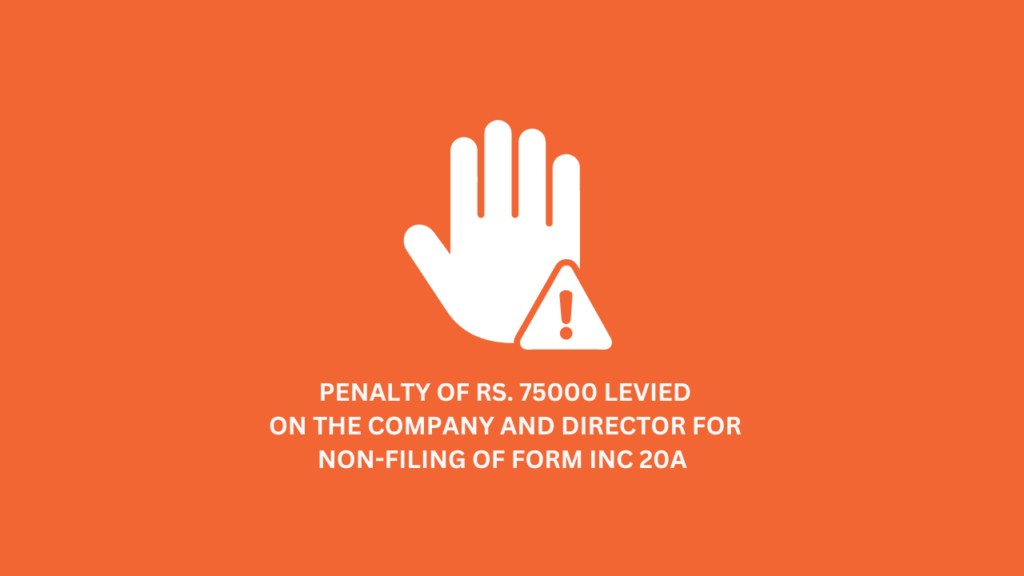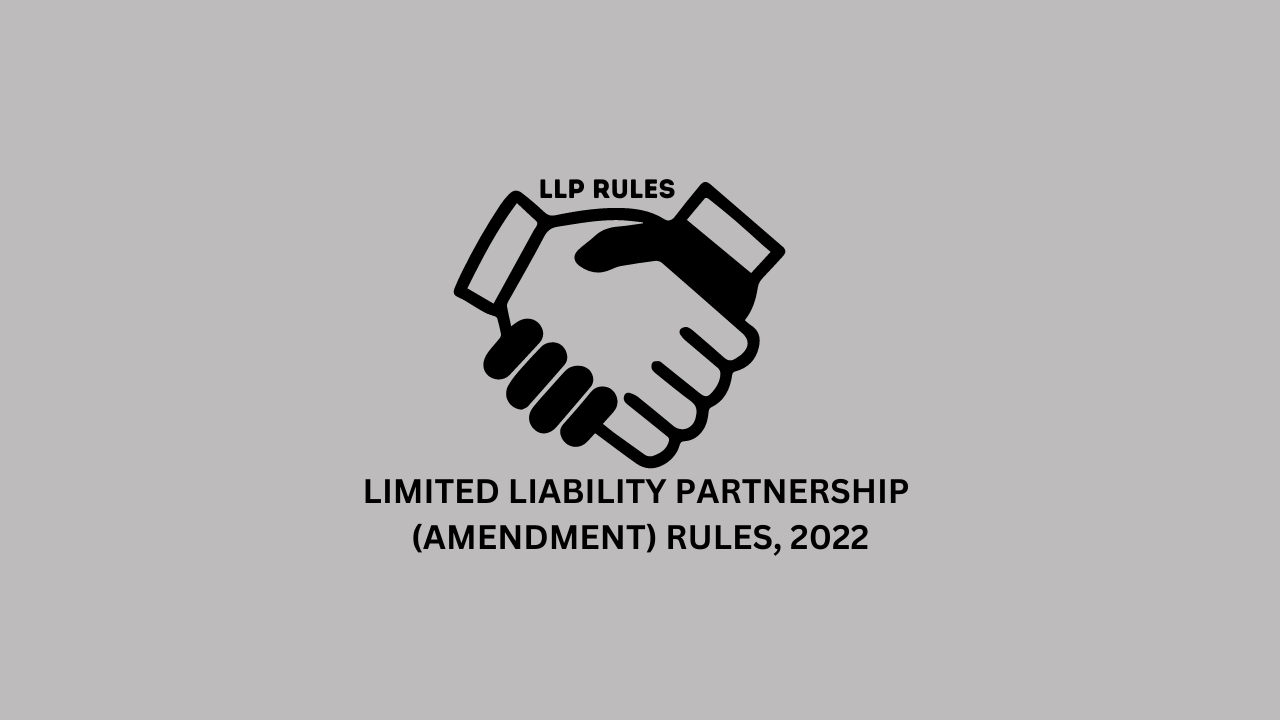
The Ministry of Corporate Affairs (MCA) has imposed a Penalty of Rs. 75000 Levied on the Company and Director for Non-Filing of Form INC 20A.
Penalty of Rs. 75000 Levied on Company and Director
In the case of Radar Security Solutions Private Limited, the Ministry of Corporate Affairs (MCA) levied a penalty of Rs. 75,000 on the company and director for failing to file Form INC 20A.
Currently registered under the jurisdiction of the Registrar of Companies, Karnataka, Radar Security Solutions Private Limited (hereinafter referred to as the “Company”) was founded on February 17, 2021, and its registered office is located at No. 4, First Floor, SY No. 369 328 52 2 Opposite to Huskur Gate Electronics City Post, Attibele Hobli, Anekal Tq, Electronics City, Bangalore 560 100.
On July 10, 2023, the corporation submitted a suo-motu application alleging that section 10A4(1)(a) of the Act had not been followed. In accordance with section 10A(1 )(a) of the Act, the business had to submit the e-form INC-20A by August 16, 2021, which is 180 days after the date of incorporation, in order to meet the deadline. Nevertheless, the business filed the same on July 12, 2022, 330 days later than expected.
According to section 10A(1)(a) of the Act, a company that was incorporated after the Companies (Amendment) Act, 2019 went into effect and that has share capital is not allowed to start any business or use any borrowing powers unless a director files a declaration with the Registrar, within one hundred and eighty days of the company’s incorporation date, certifying in the manner and form prescribed by the Registrar that each subscriber to the memorandum has paid the value of the shares that were agreed upon the date of the declaration.
Furthermore, in accordance with Rule 23A of the Companies (Incorporation) Rules, 2014, a director’s declaration under Section 10A must be in Form No. INC-20A and submitted as instructed by the Companies (Registration Offices and Fees) Rules, 2014; in practice, a company secretary, a chartered accountant, or a cost accountant will verify the information on the said form. However, if a company pursues objectives that call for approval or registration from any sectoral regulators, such as the Reser
According to section 10A(2) of the Act, in the event that any officer fails to comply with the requirements of this section, the company will be penalized fifty thousand rupees, and each day the default persists, the officer will be penalized one thousand rupees, up to a maximum of one lakh rupees.
A Notice of Hearing was delivered on November 15, 2023, in response to the company’s adjudication application, and a physical hearing was held on December 5, 2023. Mr Venugopal MThe assistant manager of the business’s accounts and finance, and Ms Veena Kirshnamurthy, a practicing company secretary and an authorized representative of the directors who made the decision, attended.
Based on the company’s submissions and financial records available on the MCA Portal, it is evident that the business satisfies the requirements of section 2(85) of the Companies Act, 2013 for small businesses. Thus, in this instance, the Act’s section 446B, which deals with imposing lighter penalties, will apply.
In accordance with section 446B of the Act, regardless of anything else in this Act, if a One Person Company, small company, start-up company, Producer Company, or any of its officers in default, or any other person in respect of such company, is required to pay a penalty for violating any of the Act’s provisions, then that company, its officer in default, or any other person, as the case may be, shall be liable to a penalty that shall not exceed half of the penalty specified in such provisions, up to a maximum of two lakh rupees for a company and one lakh rupees in the case of an officer who is in default or any other entity.
As a result, after taking into account the case’s facts and circumstances as well as the submissions made by the company, director, and key managerial personnel through their authorized representative, a penalty of Rs. 75000 is hereby imposed on the company and all officers who were in default at the time the offense was committed due to the aforementioned violation of section 10A(1) of the Companies Act, 2013.
This order directs the corporation, as well as its directors and key managerial persons, to pay the penalty amount as listed above within ninety days of receiving this order and to file Form INC-28 with a copy of the order and payment challans attached. Directors are obligated to pay this penalty amount out of their own pockets. By using the mca website (Miscellaneous Head) and providing information about this Order and the notice paying the penalty, the notice shall pay the stipulated amount of penalty online.
Within 60 days of receiving this order, any appeal, if any, may be filed in Form ADJ, which outlines the reasons for appeal, with a certified copy of this order attached. The appeal must be lodged with the Regional Director (South East Region), Hyderabad.
When two businesses merge, their boards of directors authorise the union and ask the shareholders for their consent. For instance, in 1998, the Digital Equipment Corporation and Compaq entered into a merger agreement wherein Compaq acquired the Digital Equipment Corporation. Later, in 2002, Compaq and Hewlett-Packard combined. CPQ was Compaq’s pre-merger ticker symbol. The present ticker symbol (HPQ) was created by combining this with the Hewlett-Packard ticker sign (HWP).
In a straightforward acquisition, the acquiring business buys the bulk of the acquired company, which keeps its original name and organisational structure. The 2004 acquisition of John Hancock Financial Services by Manulife Financial Corporation, in which both businesses kept their names and organisational structures, is an illustration of this kind of deal. Six By using a whitewash resolution, the target company may demand that the purchasers guarantee that the target business will continue to operate profitably for a certain amount of time following acquisition.
By merging key operations and doing away with outdated corporate frameworks, consolidation results in the creation of a new corporation. Following their acceptance, shareholders of both firms will get common equity shares in the combined company. The consolidation requires their permission. For instance, the 1998 announcement of a merger between Citicorp and Travellers Insurance Group led to the creation of Citigroup.
In a tender offer, one business proposes to pay a certain amount instead of the going rate for the other business’s outstanding stock. By passing the management and board of directors, the purchasing business makes the offer directly known to the other company’s shareholders. For instance, Johnson & Johnson submitted a $438 million tender offer to purchase Omrix Biopharmaceuticals in 2008. By the end of December 2008, the agreement had been finalised when the company accepted the tender offer.
An asset acquisition occurs when a business directly buys the assets of another business. The shareholders of the company whose assets are being acquired must provide their permission. During bankruptcy procedures, it is common for other companies to bid for different assets of the insolvent company. The bankrupt company is then liquidated upon the ultimate transfer of assets to the purchasing firms.
In a management acquisition, which is often referred to as a management-led buyout (MBO), the executives of one firm acquire a majority stake in another, therefore bringing it private. In an attempt to assist with financing a transaction, these former CEOs frequently collaborate with financiers or former corporate officers. These M&A deals usually require the approval of the majority of shareholders and are financed mostly through debt. For instance, Dell Corporation declared in 2013 that its founder, Michael Dell, had purchased the company.








